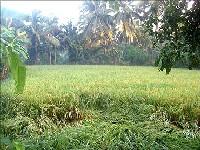While the Centre and several state governments are facing a tough time over land acquisition issues back home, Ethiopia on Wednesday offered "virgin fertile" land to Indian companies for agricultural developments. During a bilateral meeting between Prime Minister Manmohan Singh and his Ethiopian counterpart, Meles Zenawi, the latter told Singh that his government had identified three million hectares of fertile land for agriculture in his country and he would like foreign investors to come and invest in agriculture in those areas.
During a bilateral meeting between Prime Minister Manmohan Singh and his Ethiopian counterpart, Meles Zenawi, the latter told Singh that his government had identified three million hectares of fertile land for agriculture in his country and he would like foreign investors to come and invest in agriculture in those areas.
In his statement after the meeting, Singh said the two sides had decided to enhance the bilateral relations in a number of areas including agricultural research.
New Delhi sees this as an opportunity but points out it would be "simplistic" to try to find a direct link between these land resources and India's food security issues.
"Indian investment in agriculture in Ethiopia will definitely result in an economic linkage between India and Ethiopia. The Ethiopian government welcomes Indian investment in these areas. They want crops to be cultivated here, its locals get employment and then the products to be exported," said a senior Indian official present in the meeting.
While announcing his African bonanza at the Africa-India Summit on Tuesday, Prime Minister Manmohan Singh extended an additional line of credit of US$300 million for a regional integration project as committed to the African Union for a new Ethiopia-Djibouti railway.
The officials also pointed out that India was already looking at Africa-based farms to meet the domestic supply of pulses, among other things.
Out of the US$660-million Indian investments in Ethiopia, almost 65 per cent is involved in agriculture.
In Ethiopia, the second-most populous nation in Africa, almost 85 per cent of the population depends on agricultural activities. New Delhi is optimist about this offer, as it has also noted that Ethiopia enjoys political stability which is often missing in many other African countries.
Ethiopia already boasts of the Indian horticultural farm Karuturi & Co, the largest producer and exporter of roses in the world.
The company, which holds large tracts of land in Ethiopia and Kenya, also employs 99.8 per cent of its workers from local areas. Karuturi currently has a 3,500-strong workforce.







